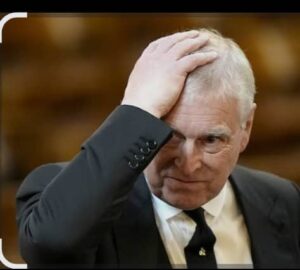

The concept of royalty is built on a foundation of inherited privilege, a mystique of “blue blood” that ostensibly sets its bearers apart. For centuries, this bloodline was considered immutable, a permanent mark of divine or hereditary right. Yet, the dramatic fall of Prince Andrew, the Duke of York, illustrates a profound modern truth: in the court of public opinion and under the harsh glare of scandal, blue blood can be transfused into the same red that flows in every human being.
 For decades, Andrew occupied a gilded space within the British monarchy. The Queen’s favourite son, a Falklands War hero, and a globe-trotting royal trade envoy, he seemed to embody the traditional and modern roles of the House of Windsor. His life was one of palaces, titles, and a near-impenetrable shield of status. The colour of his blood, metaphorically speaking, was never in question.
For decades, Andrew occupied a gilded space within the British monarchy. The Queen’s favourite son, a Falklands War hero, and a globe-trotting royal trade envoy, he seemed to embody the traditional and modern roles of the House of Windsor. His life was one of palaces, titles, and a near-impenetrable shield of status. The colour of his blood, metaphorically speaking, was never in question.
That shield, however, began to tarnish irreparably with his association with the convicted sex offender Jeffrey Epstein. What started as a questionable friendship spiralled into a catastrophic crisis for the monarchy. The 2019 BBC Newsnight interview was intended as a rebuttal; it became a masterclass in public relations disaster. Andrew’s performance—showing a lack of empathy for Epstein’s victims, an inability to recall key events, and an alibi that was swiftly dismantled—did not just fail to convince. It severed a vital connection with the public.
The carefully crafted image of the dutiful royal evaporated, replaced by that of a man seemingly out of touch, entitled, and mired in a sordid international scandal. The “blue blood” of royalty suddenly looked very human, and very flawed.
The final, formal severance came in swift, brutal blows. In January 2022, following the filing of a civil suit by Virginia Giuffre, he was stripped of his military affiliations and royal patronages. The title “His Royal Highness” was effectively retired for his public use. The institution of the monarchy, personified by his mother the late Queen and now King Charles III, moved to surgically remove a perceived threat to its survival. The prince was being returned to sender, his royal functions voided.
The ultimate transition from blue blood to red was sealed this year with his effective eviction from Royal Lodge, his home of over 20 years. The message was unambiguous: the privileges of royalty are contingent on its responsibilities. When the latter are catastrophically abandoned, the former can and will be revoked.
Prince Andrew’s story is no longer one of royalty, but of a man facing the consequences of his choices. He retains his title as Duke of York, but it is an empty shell, stripped of its power and purpose. He remains a wealthy man, but he is now a private citizen grappling with a very public infamy. The mystique has been replaced by scrutiny, the privilege by probation.
His journey from the pinnacle of inherited status to a state of ordinary, albeit privileged, humanity is a stark parable for the modern age. It proves that while bloodlines may be written in history books, character is written in our actions. And in the relentless court of the 21st century, no amount of blue blood can protect you when your own human failings are laid bare for the world to see. Prince Andrew’s blood, it turns out, was always as red as anyone else’s; it just took a seismic scandal for everyone to see it.
By Alao Adamadamosi Sunday arpa,write from Lokoja.
